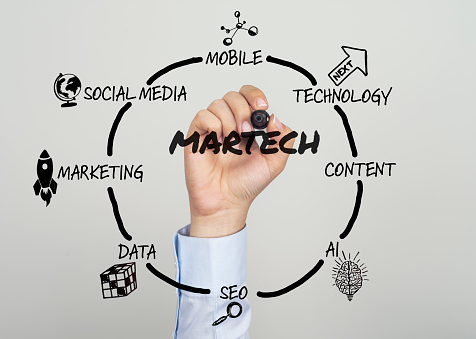Marketing is a huge process that includes planning and execution of ideas, pricing, and promotion of goods and services. It deals with the needs of the market, the organization of production and sales of products. Identifying and meeting human and societal needs requires a serious approach. That’s why marketing has become more and more dependent on technology lately, and the tools that meet the needs of modern marketing are called MarTech software. Let’s take a closer look at MarTech and understand how it affects the marketing topic.
What is MarTech ?
MarTech is the term for the software used to plan, produce and measure the results of marketing activities, as well as the relationship with customers.
These tools are used for literally everything related to brand communication, from finding great deals during the pre-holiday discount period to re-sourcing a new audit firm for a business.
Such software offers the following features:
- Evaluating the effectiveness of campaigns at the planning stage
- Using data for microtargeting
- Data visualization for informed decision making
- Communication with users
It is worth noting that these are just the basic features, or as you might call them, the capabilities that MarcTech uses. Depending on the requirements, other functions can also be implemented.
DAM and Others MarTech Stack Components
The MarTech stack usually consists of several basic technologies, although they may vary in specific cases. Some choose the path of complex stacks, while others choose only the essentials. It is important to note that it is necessary to cover the entire marketing cycle, as follows:
- Digital Asset Management (DAM) – this solution is the base or, one might say, the heart of the MarTech stack. It helps manage the lifecycle of marketing materials, simplifies release and approval processes, and provides controlled access to all materials from multiple devices. The ability to flexibly search in a centralized repository saves time for everyone in the company. DAM is an effective marketer’s toolkit and universal brand management platform.
- Data Integration Tools – they combine disparate data from different systems, thereby making it easier for the marketing team to get a more holistic view of the business.
- Analytics Tools – without analytics, you won’t have the opportunity to improve, so it’s also a key component. These tools provide a quantitative means of measuring the effectiveness of marketing messages, campaigns, channels and more.
- Social Media – these tools are essential for monitoring social media activity, posts and more. They help easily measure the popularity and relevance of a brand on social media.
- Customer Relationship Management – with the help of CRM you can automate routine business processes of the company and establish effective work within the company.
- Search Engine Optimization (SEO) – SEO is often a key strategy for attracting traffic to a site by increasing search engine rankings. There are many tools available to help with keyword research and other SEO-related initiatives.
These are just some of the general technologies that are present in most modern MarTech stacks. There are quite a few of them, so they don’t look alike from one company to another. But as you may have noticed, absolutely everywhere there will be DAM.
Advantages of MarTech
MarTech has quite a number of advantages, which are even difficult to list in one article as each relates to a different aspect. One of the most important is of course the automation of processes and analytics, which provides the ability to collect data and expand the possibilities of working with them. Of course, let’s not forget about the savings of time and other resources of sales professionals. Also new technologies allowed more convenient management of communication and sales channels. This all happens with constant analysis, which allows you to quickly identify any shortcomings and improve the effectiveness of any marketing channels.
But one of the most important advantages is of course the availability of software solutions, which in turn allow easy integration with each other, creating a unified system of marketing services.
Conclusion
As you can see, modern marketing is completely dependent on technology and software to help perform various functions. It increases the effectiveness of marketing processes, collects and analyzes data, and helps ensure contact with the audience and get the maximum effect from it. It is safe to say that marketing today is simply impossible without MarTech.
